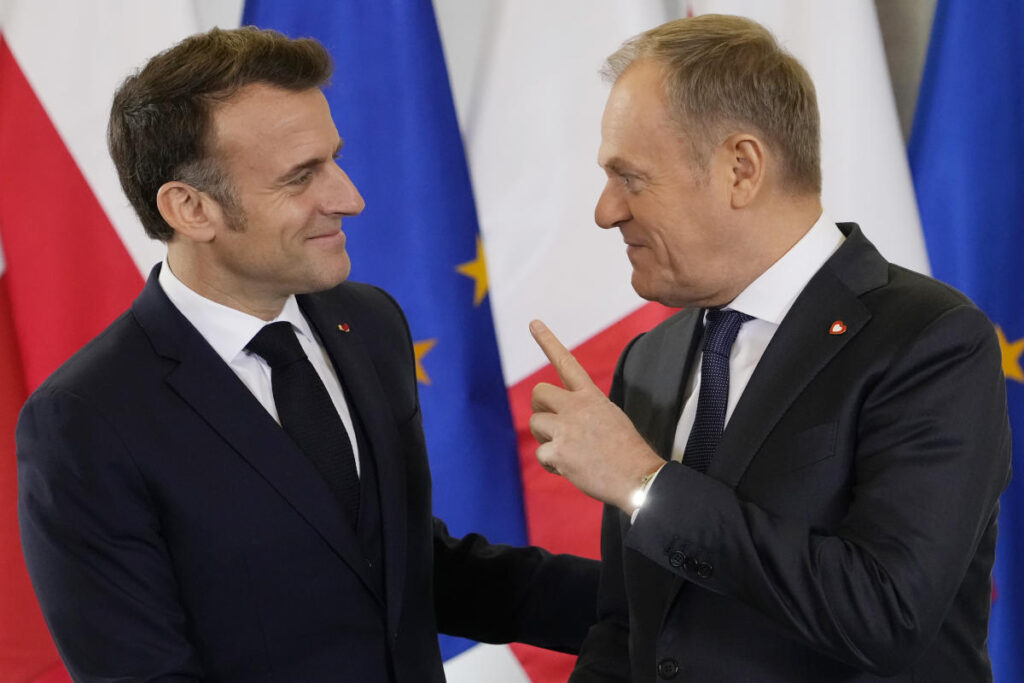On a recent visit to Warsaw, French President Emmanuel Macron and Polish Prime Minister Donald Tusk underscored the vital role Ukraine should play in any discussions regarding the ongoing conflict with Russia. Their meeting highlighted the importance of aligning European security strategies closely with U.S. interests, especially considering the volatility of the situation following the Russian invasion of Ukraine that began in February 2022. Macron expressed the need for Europe to engage actively in security negotiations, emphasizing a cooperative approach that encompasses the wishes and sovereignty of Ukraine in light of its current struggles.
During their joint statements, Tusk echoed Macron’s sentiment, affirming Ukraine’s necessity at the negotiating table. He remarked that all proposals for peace must receive the approval of the Ukrainian government, underlining Poland’s strong support for Ukraine throughout the war. This commitment is crucial given Poland’s geographical proximity and historical ties with Ukraine, positioning it as a key player in bolstering Ukraine’s defense against Russian aggression. Tusk maintained a firm stance on Poland’s decision-making autonomy, dismissing rumors of sending Polish troops to Ukraine under a potential ceasefire agreement as mere speculation.
The timing of this meeting was significant, considering Macron’s recent discussions with President-elect Donald Trump and Ukrainian President Volodymyr Zelenskyy in Paris. The interactions have raised expectations regarding the incoming U.S. administration’s approach to the conflict. Trump has indicated a desire for a shift in strategy, which could influence European and NATO responses to the war and the feasibility of peace negotiations. Macron’s insistence on a cooperative approach suggests that European nations need to be more proactive in shaping the discourse around security in the region.
Macron’s comments underscored a critical point that any negotiations must prioritize not only Ukrainian sovereignty but also the collective security interests of Europe. The French leader described the need for a partnership with the United States, arguing that effective negotiation frameworks must integrate the perspectives and needs of both Europe and Ukraine. The call for collaborative efforts highlights the expectation that the next U.S. administration will take a more active role in international diplomacy concerning the war in Ukraine, particularly in facilitating conversations among the involved parties.
As Poland prepares to assume the presidency of the European Union in the coming weeks, the discussions in Warsaw are likely to set the tone for Europe’s diplomatic stance going forward. Prime Minister Tusk’s assertion that decisions regarding military involvement must originate exclusively from Poland signifies a cautious approach amidst ongoing discussions about potential military assistance to Ukraine. The Polish government aims to ensure that any commitments made are in alignment with national interests and the broader European strategy regarding Russia.
In conclusion, the meeting between Macron and Tusk encapsulates a pivotal moment in the European response to the conflict in Ukraine. Their dialogue reflects a unified stance on the necessity of Ukrainian participation in peace negotiations and the importance of European involvement in security discussions alongside the United States. As entities in the region brace for the ramifications of the changing political landscape in Washington, both leaders recognize that a coherent and collective approach will be essential for fostering peace and stability in Ukraine and across Europe.

